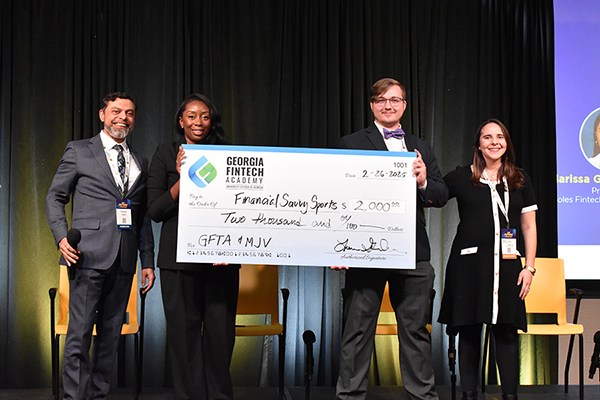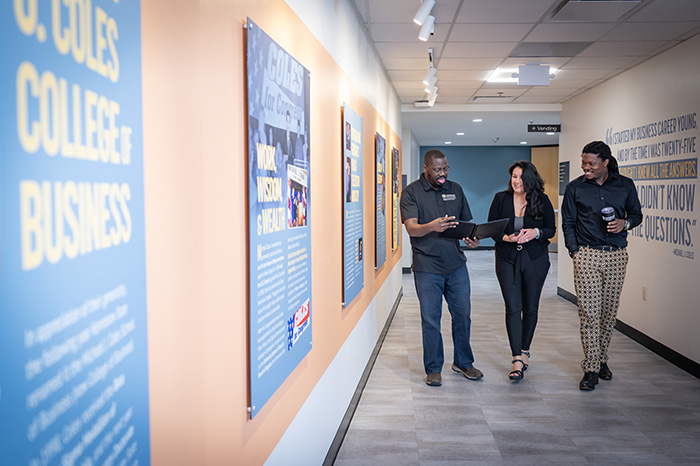
Kennesaw State University Accounting Students Are Setting the Standard
KENNESAW, Ga. | Mar 30, 2022
While most accounting students are content to simply study accounting rules, students at Kennesaw State University would rather play a role in creating them.
The Financial Accounting Standards Board (FASB) – the body responsible for establishing the accounting rules for publicly traded companies in the U.S. – recently asked for public comment on a new proposed rule change. When they did, Assistant Professor Mary Hill’s Master of Accounting students answered the call. The class worked together to conduct research and draft an official comment letter, which they each signed before submitting to the FASB.

Their letter addresses proposed rule changes governing supplier finance. Supplier finance involves a third party paying invoices on behalf of their client and billing the client later. As with a line of credit, clients can maximize cash flow by effectively extending their due date on bills. See the Kennesaw State student’s comment letter.
FASB comment letters are typically submitted by accounting firms, investor groups, and other professional organizations. For Hill’s students, participating in the process gave them a chance to play a more active role in an industry they are already passionate about.
“I think it’s great that, as students, we can comment on new exposure drafts on the same footing as major accounting firms and investment groups,” said MAcc student Blake Wiles. “I feel like participating in this process has helped me appreciate all the accounting standards I’ve learned during my graduate and undergraduate studies.”
During the project, Hill assigned students into groups, with each researching the rule change and creating their own letter outlining their concerns and suggestions for the FASB. The class then met to consolidate their work into a single comment letter.
Comment letters are part of the public record. Anyone can read them and the FASB never deletes them from their website. Hill said this permanence inspired her students to put aside their egos and work together on something they could all be proud of.
“The students really bought into the idea that this letter represents them as a class,” Hill said. “After submitting their assignment and receiving their grade, there’s still plenty of work to do drafting the joint class letter. They recognized that this letter was going to be public record and have Kennesaw State’s name on it. They wanted their class letter to be the best it could.”

This is the second year in a row Hill has built this project into her coursework. After years of teaching students about the FASB and its role in setting the rules for U.S. companies, she realized that participating in the process was the best way for students to learn it.
“I used to always take students to the FASB website and let them read comments on proposed regulations, and they always enjoyed that,” Hill said. “I would tell the students that they should comment someday. I realized it’s one thing to talk about someday, and another to actually do it.”
Hill’s novel approach to teaching accounting standards has caught the attention of the FASB as well as members of the professional accounting community. After submitting last year’s comment letter, FASB board member Christine Botosan reached out to Hill encouraging her to submit an article on the project to an education journal. Hill is currently partnering on the article with University of Alabama Accounting Professor Gary Taylor, who has replicated Hill’s approach with his own students. The two plan to publish their article this year.
Another person impressed by what the Kennesaw State MAcc students are doing is David Gonzales, vice president and senior accounting analyst for $5+ billion financial services firm Moody’s. Gonzales reads most FASB comment letters as part of his job. When he came across Hill’s class’s 2021 letter, he reached out to learn more about the project.
“It was all very impressive,” Gonzales said “This project is such a great way to help understand the standard-setting process. A lot of thought goes into accounting standards, and you can’t improve what you don’t understand. These students will use this experience to become better accountants for years to come.”
He has since taken on a mentorship role in Hill’s class. During the last year, he has spoken to the class about accounting policies, provided career guidance, and has invited students to network with him on LinkedIn.
For Hill’s students, the experience of actively participating establishing new accounting rules has created a sense of accomplishment in themselves and in their institution.
“Kennesaw State is a university with great merit that has enabled my cohort to represent it because we are accustomed to achieving at the highest level,” said student Lauren Goodrum. “We accomplished our goal of perfecting the letter by working together during the letter writing process and incorporating the recommendations that best reflect the excellence that Kennesaw State University represents.”
-Patrick Harbin
Related Posts

Innovative Minds Shine at KSU's Digital Payments Pitch Competition

Kennesaw State professor honored by American Accounting Association as 2025 Presidential Scholar

CEO Magazine Ranks Kennesaw State Executive MBA Top Program in Georgia, No. 10 in the World

Kennesaw State business student finds research niche in virtual reality














